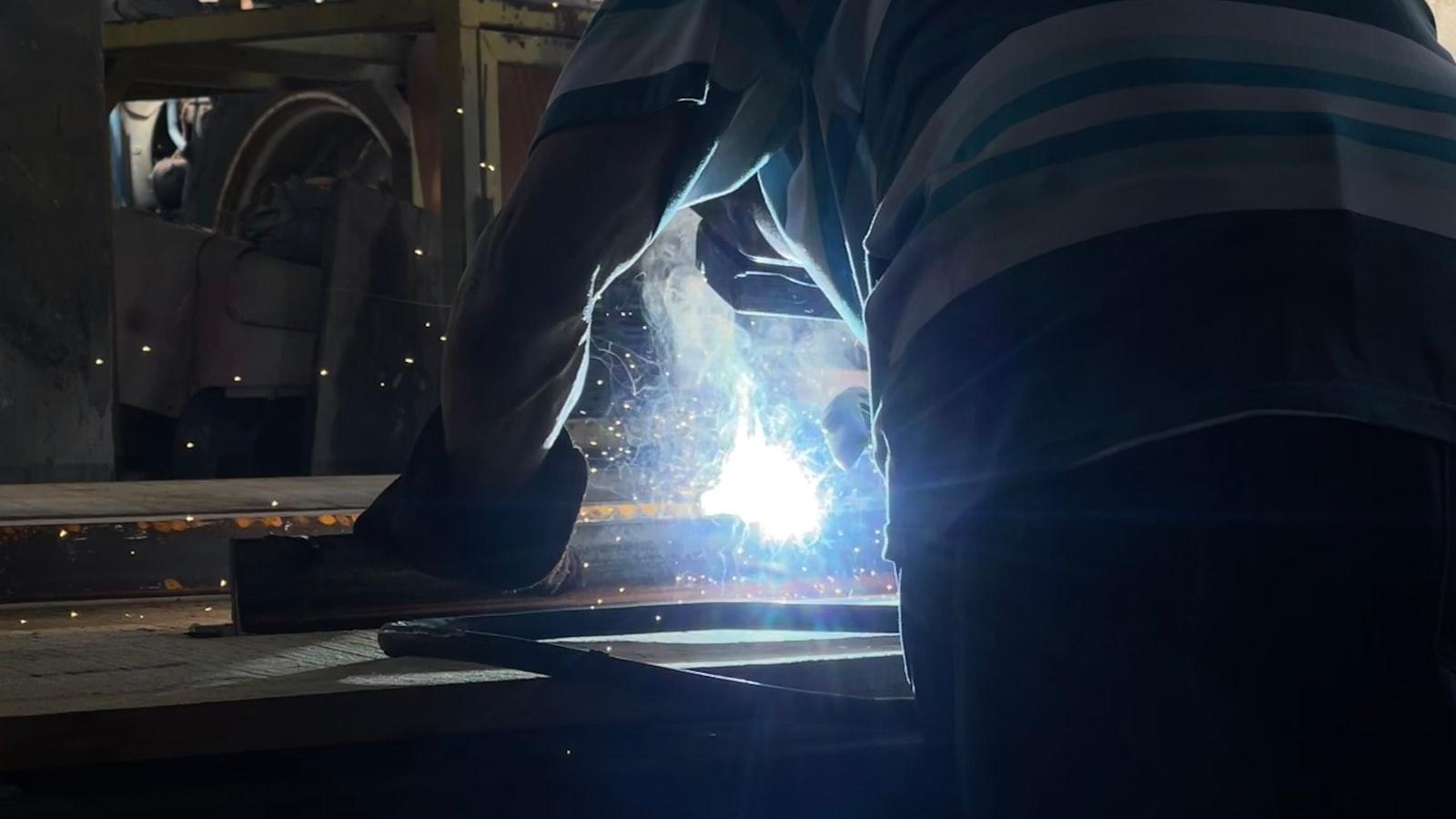How much does a welder make? The answer to this question varies depending on the level of experience, skills, and location. With 13 years of welding experience, I have seen firsthand how the wages of welders can differ based on various factors. Let’s dive deeper into the average salary range for welders and explore potential opportunities in this rewarding field.
Table of Contents
- Average salary of welders in the United States
- Factors influencing the salary of welders
- Highest paying industries for welders
- Ways to increase earning potential as a welder
- Benefits of pursuing certification and specialized training in welding
- Comparison of salaries for different types of welding techniques
- Geographical differences in welder salaries in the United States
- Q&A
- My experiance

Average salary of welders in the United States
Welders in the United States can expect to earn a solid income, with salaries varying depending on factors such as location, experience, and industry. The average salary for welders in the US falls around $44,000 annually. However, keep in mind that this figure can fluctuate significantly, with some welders earning upwards of $60,000 or more per year.
It’s important to note that entry-level welders may start off with a lower salary, typically around $30,000 per year. As welders gain experience and expertise in the field, their earning potential can increase significantly. Experienced welders with specialized skills or certifications can command higher salaries, sometimes reaching $80,000 or more annually.
Welders working in certain industries or regions may also earn higher salaries. For example, welders in the oil and gas industry often earn higher wages due to the demanding nature of the work. Additionally, welders in states with a high demand for skilled labor may see higher salaries compared to those in areas with less demand.
If you’re considering a career in welding, it’s worth researching the specific industry and region you’re interested in to get a better idea of the earning potential. Keep in mind that pursuing additional certifications or specialized training can also help boost your salary in the long run.
Overall, welding can be a rewarding career path with the potential for a stable income. With the right skills, experience, and industry knowledge, welders in the United States can earn a respectable salary that reflects their hard work and expertise in the field.
Factors influencing the salary of welders
can vary significantly based on a few key elements. One of the most important factors is the level of experience a welder has. Beginners will typically earn less than those with several years of experience under their belts. It’s crucial for welders to continue learning and honing their skills to unlock higher earning potentials. Another significant factor is the type of welding being performed. Specialized welding techniques such as underwater welding or aerospace welding can command higher salaries due to the unique skills required.
Furthermore, the location where a welder works can greatly impact their salary. For instance, welders working in metropolitan areas or industries requiring high demand for skilled labor may receive higher compensation compared to those in rural areas. Additionally, the size of the company can also play a role in determining a welder’s salary. Larger companies with more resources may offer higher wages than smaller businesses.
Another crucial factor influencing a welder’s salary is their certifications and qualifications. Welders with additional certifications in specific welding techniques or safety protocols may be able to command higher salaries due to their expertise. Continuously seeking additional certifications can help welders stay competitive in the ever-evolving field. Additionally, welders who are willing to work non-traditional hours or in challenging environments may also receive higher compensation due to the nature of the work.
Finally, economic factors such as supply and demand can influence a welder’s salary. During times of high demand for skilled welders, wages may increase to attract and retain talent. Conversely, during economic downturns or periods of low demand, welders may see a decrease in their earning potential. Staying informed about market trends and job outlook can help welders navigate fluctuations in their salary. By considering these various factors, welders can strategically position themselves to maximize their earning potential in the field.
Highest paying industries for welders
When it comes to welding, the earning potential can vary greatly depending on the industry you work in. Some industries value skilled welders more than others, leading to higher pay rates. If you’re looking to maximize your earning potential as a welder, you’ll want to consider working in one of the highest-paying industries in the field.
One industry that offers top dollar for welders is the aerospace industry. Aerospace companies require precise and high-quality welding to ensure the safety and functionality of their products. This demand for skilled welders translates to higher wages for those working in this industry.
Another lucrative industry for welders is the oil and gas industry. Welders in this field are responsible for constructing and maintaining pipelines, rigs, and other essential infrastructure. The specialized skills needed for welding in this industry command higher salaries.
If you’re interested in working with cutting-edge technology, consider pursuing a career in the automotive manufacturing industry. Welders in automotive manufacturing facilities are tasked with welding together parts for cars, trucks, and other vehicles. The precision and expertise required for this work often result in above-average pay rates.
For welders who enjoy working with their hands and have a knack for creativity, the construction industry can offer excellent earning potential. Construction welders work on large-scale projects such as bridges, buildings, and highways, completing intricate and essential welding tasks that are well-compensated.
Lastly, the manufacturing industry is a fantastic option for welders seeking high-paying opportunities. Welders in manufacturing plants are responsible for producing a wide range of products, from furniture to machinery. The demand for skilled welders in this industry ensures competitive wages for those with the necessary expertise.
In conclusion, if you’re looking to maximize your earning potential as a welder, consider exploring opportunities in these high-paying industries. With the right skills and experience, you can unlock a world of possibilities and secure a lucrative career in welding.
Ways to increase earning potential as a welder
To increase your earning potential as a welder, you need to stay updated on the latest welding techniques and technologies. Embracing new methods like robotic welding or laser welding can set you apart from the competition and make you more valuable to employers. Learning new skills is essential in the ever-changing world of welding.
Specializing in a niche area of welding can also boost your income. Whether it’s underwater welding, aerospace welding, or pipeline welding, becoming an expert in a specific field can command higher pay rates. Focusing on a specialized skill set can open doors to lucrative opportunities.
Certifications play a crucial role in increasing your earning potential as a welder. Achieving certifications from organizations like the American Welding Society (AWS) or the American Society of Mechanical Engineers (ASME) can demonstrate your expertise and proficiency in the industry. Certifications are a badge of honor that can translate to higher pay.
Networking is another effective way to enhance your earning potential. Building relationships with other welding professionals, attending industry events, and joining professional organizations can lead to job opportunities, referrals, and insider information on well-paying projects. Networking can be a game-changer in the competitive world of welding.
Investing in your own equipment and tools can also help you command higher wages. By having your own gear, you can take on freelance projects, work on personal welding projects, and even rent out your equipment when you’re not using it. Owning your tools gives you the flexibility to take on more work and increase your income.
Benefits of pursuing certification and specialized training in welding
Specialized training and certification in welding can open up a world of opportunities for individuals looking to excel in this field. The benefits of pursuing such qualifications are not only financial but can also lead to personal and professional growth. By undergoing training, welders can enhance their skills, improve their job prospects, and increase their earning potential.
One of the main benefits of obtaining certification and specialized training in welding is the competitive edge it provides in the job market. Certified welders are in high demand due to their expertise and knowledge in the field. This can lead to better job security, increased job opportunities, and the ability to negotiate higher salaries.
Additionally, pursuing certification and specialized training in welding can lead to greater job satisfaction. With advanced skills and qualifications, welders are more likely to work on challenging and interesting projects. This can result in a sense of accomplishment and pride in their work, making the job more fulfilling and rewarding.
Moreover, certified welders often have access to a wider range of job benefits, such as healthcare, retirement plans, and paid time off. Employers value certified professionals and are more likely to provide additional perks and incentives to retain top talent. This can lead to a better work-life balance and overall job satisfaction.
In conclusion, the are numerous and can significantly impact the career and financial prospects of individuals in the field. By investing in their education and skill development, welders can unlock doors to new opportunities, increased earnings, and overall job satisfaction.

Comparison of salaries for different types of welding techniques
When it comes to welding techniques, the salaries can vary depending on the type of welding being done. Let’s take a look at the .
1. Stick Welding: Stick welding, also known as Shielded Metal Arc Welding (SMAW), is one of the most common types of welding techniques. Welders proficient in stick welding can earn an average salary of $42,000 per year.
2. MIG Welding: MIG Welding, or Gas Metal Arc Welding (GMAW), is another popular welding technique. Welders skilled in MIG welding can expect to make around $50,000 annually on average.
3. TIG Welding: TIG Welding, or Gas Tungsten Arc Welding (GTAW), is a more intricate and precise welding technique. Welders specializing in TIG welding can earn a higher salary compared to other techniques, with an average annual income of $60,000.
4. Flux-Cored Arc Welding: Flux-Cored Arc Welding (FCAW) is a versatile welding technique suitable for various applications. Welders experienced in FCAW can make approximately $55,000 per year on average.
5. Submerged Arc Welding: Submerged Arc Welding (SAW) is commonly used in heavy-duty industries. Welders proficient in submerged arc welding can earn a salary of around $65,000 annually, making it one of the highest-paying welding techniques.
In conclusion, the salaries for different types of welding techniques vary based on the complexity, skill level, and industry demand. It’s essential for welders to continue advancing their skills and certifications to unlock higher-paying opportunities in the ever-evolving world of welding.
Geographical differences in welder salaries in the United States
When it comes to welder salaries in the United States, there are significant geographical differences that can impact how much you can expect to make. For those looking to pursue a career in welding, it’s essential to understand these variations and factors that contribute to them. Below, we break down some of the key points regarding welder salaries across different states in the U.S.
-
Average Salaries: The average salary for welders in the United States is around $42,000 per year. However, this figure can vary greatly depending on where you work. States like Alaska, Hawaii, and North Dakota tend to offer the highest salaries for welders, while states in the South often have lower average salaries.
-
Cost of Living: It’s important to consider the cost of living in different states when looking at welder salaries. While some states may offer higher salaries, the cost of living in those areas may also be much higher. States like California and New York, for example, may offer higher salaries but also come with a higher cost of living.
-
Industry Demand: Another factor that can impact welder salaries is the demand for welders in different industries. States with a high demand for welders, such as those with a strong manufacturing or construction sector, may offer higher salaries to attract skilled workers.
-
Certifications and Experience: Welders with certifications and years of experience under their belt may command higher salaries than those who are just starting out in the field. Investing in additional training and certifications can help you increase your earning potential as a welder.
-
Job Opportunities: In addition to salaries, it’s important to consider job opportunities when choosing where to work as a welder. Some states may have more job openings for welders, while others may have a more competitive job market. Researching job availability in your area of interest can help you make an informed decision about where to work as a welder.
Q&A
Q: How much does a welder typically make?
A: The average annual salary for a welder in the United States is around $42,000. However, this can vary depending on factors such as experience, location, and industry.
Q: What are some factors that can affect a welder’s salary?
A: Experience plays a significant role in determining a welder’s salary, with more seasoned professionals typically earning higher wages. Additionally, welders working in industries such as oil and gas extraction or manufacturing tend to earn more compared to those in other sectors.
Q: Is there potential for advancement in the welding profession?
A: Yes, there are opportunities for advancement within the welding profession. Welders who obtain additional certifications, such as becoming a certified welding inspector, can increase their earning potential. Additionally, skilled welders may have the opportunity to move into supervisory roles or even start their own welding businesses.
Q: Are there any specific locations where welders tend to earn higher salaries?
A: Welders working in states with a higher demand for their services, such as Texas, California, and Alaska, may earn higher salaries than those in less densely populated areas. Additionally, urban areas often offer higher wages for welders due to increased job opportunities.
My experiance
In conclusion, the salary of a welder can vary depending on factors such as experience, location, and industry. However, with a high demand for skilled welders in various sectors, the earning potential for welders is promising. It is important for individuals considering a career in welding to research the average pay in their area and to continually strive for professional growth and advancement to maximize their earning potential. Overall, welding can be a financially rewarding and stable career choice for those who are dedicated and committed to honing their skills in this essential trade.

Leave a Reply